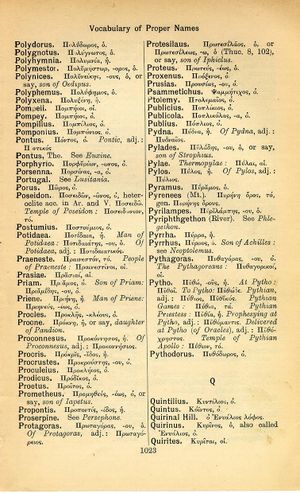Prometheus: Difference between revisions
Θάλασσα καὶ πῦρ καὶ γυνὴ τρίτον κακόν → Tria magna mala sunt: aequor, ignis, femina → Das dritte Übel ist nach Meer und Brand die Frau
m (Text replacement - "link={{" to "link={{") |
m (Text replacement - "(|thumb)\n(\|link=)" to "$1$2") |
||
| Line 1: | Line 1: | ||
{{WoodhouseENELnames | {{WoodhouseENELnames | ||
|Text=[[File:woodhouse_1023.jpg|thumb | |Text=[[File:woodhouse_1023.jpg|thumb|link={{filepath:woodhouse_1023.jpg}}]][[Προμηθεύς]], -έως, ὁ, or say, <b class="b2">son of Iapetus.</b> | ||
|link={{filepath:woodhouse_1023.jpg}}]][[Προμηθεύς]], -έως, ὁ, or say, <b class="b2">son of Iapetus.</b> | |||
}} | }} | ||
{{Lewis | {{Lewis | ||
Revision as of 17:00, 18 May 2020
English > Greek (Woodhouse)
Προμηθεύς, -έως, ὁ, or say, son of Iapetus.
Latin > English (Lewis & Short)
Prŏmētheus: (trisyl.), ĕi and ĕos, m., =Προμηθεύς (the Forethinker),
I a son of Iapetus and Clymene, brother of Epimetheus, and father of Deucalion. He formed men of clay, and animated them by means of fire brought from heaven; for which he was fastened to Caucasus, where a vulture, or, as some say, an eagle, fed upon his entrails, until, at last, it was slain by Hercules, Cic. Tusc. 3, 31, 76; Auct. Her. 4, 6, 9; Hor. C. 1, 16, 13; Ov. M. 1, 82; Hyg. Fab. 54; 144; Verg. E. 6, 42; Prop. 3, 3, 29 (4, 4, 7); Mart. 11, 85, 9; Stat. Th. 11, 478; Lact. 2, 10, 5.—Poet., transf., of a skilful potter, Juv. 4, 133.—Hence,
A Prŏmēthēus, a, um, adj., of or belonging to Prometheus, Promethean: juga, i. e. the Caucasus, Prop. 1, 12, 10; also called rupes, Mart. 9, 46, 3: fibra, of Prometheus, Val. Fl. 7, 356: creta, Col. poët. 10, 59: lutum, Mart. 10, 39, 4: cruor, Ov. Am. 2, 16, 40: manus, Stat. Th. 8, 305.—
B Prŏmēthĭădes, ae, m. patron., the son of Prometheus, Deucalion, Ov. M. 1, 390.
Latin > French (Gaffiot 2016)
Prŏmētheūs¹² (trissyll.), ĕī ou ĕos, m. (Προμηθεύς), Prométhée [fils de Japet, frère d’Épiméthée, père de Deucalion, fit l’homme d’argile et l’anima avec le feu du ciel qu’il avait dérobé ; en punition il fut attaché sur le Caucase, où un vautour lui rongeait le foie ; il fut délivré par Hercule] : Cic. Tusc. 3, 76 || [poét.] un habile potier : Juv. 4, 133 || -ēus, a, um, de Prométhée : Promethea juga Prop. 1, 12, 10, le Caucase.
Latin > German (Georges)
Promētheus, eī u. eos, Akk. ea u. eum, Vok. eu, m. (Προμηθεύς, der Vorausdenker), Sohn des Japetus, Bruder des Epimetheus und Vater des Deukalion, bildete der Sage nach die Menschen aus Ton und belebte sie durch Feuer, das er vom Himmel geholt hatte, wofür er zur Strafe an den Kaukasus geschmiedet wurde; ein Geier, den schließlich Herkules tötete, fraß seine Eingeweide, Acc. tr. 534. Varro LL. 5, 31. Cornif. rhet. 4, 9. Cic. Tusc. 5, 8. Hyg. fab. 142 u. 144. Lact. 2, 10, 5: Genet. -ei, Prop. 2, 1, 69. Verg. ecl. 6, 42; -eos, Stat. Theb. 11, 468. – Akk. -ea, Hor. carm. 2, 18, 35. Sen. contr. 10, 5 (34) 1; eum, Hyg. fab. 54: Vok. -eu, Cic. poët. Tusc. 3, 76. – alle Kasus, Hyg. astr. 2, 15. – Prometheus ille Aeschyli, in der Tragödie des Äschylus, Cic. Tusc. 3, 76: is liber (Maecenatis), qui ›Prometheus‹ inscribitur, Sen. ep. 19, 9. – appell. wie im Griechischen = Bildner in Ton, Iuven. 4, 133. – Dav.: A) Promēthēus, a, um (Προμήθειος), zu Prometheus gehörig, promethëisch, iuga, v. Kaukasus, Prop.: creta, Colum. poët.: scopuli, Sen. tr.: rupes, Mart. – B) Promēthīdēs, ae, m., der Promethide (Sohn des Prometheus), d.i. Deukalion, Ov. met. 1, 390.

